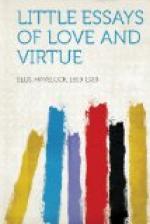[5] “The man who separated the thought of chastity from Service and made it revolve round Self,” wrote Hinton half a century ago in his unpublished MSS., “betrayed the human race.” “The rule of Self,” he wrote again, “has two forms: Self-indulgence and Self-virtue; and Nature has two weapons against it: pain and pleasure.... A restraint must always be put away when another’s need can be served by putting it away; for so is restored to us the force by which Life is made.... How curious it seems! the true evil things are our good things. Our thoughts of duty and goodness and chastity, those are the things that need to be altered and put aside; these are the barriers to true goodness.... I foresee the positive denial of all positive morals, the removal of all restrictions. I feel I do not know what ‘license,’ as we should term it, may not truly belong to the perfect state of Man. When there is no self surely there is no restriction; as we see there is none in Nature.... May we not say of marriage as St. Augustine said of God: ’Rather would I, not finding, find Thee, than finding, not find Thee’?... ‘Because we like’ is the sole legitimate and perfect motive of human action.... If this is what Nature affirms then it will be what I believe.” This dynamic conception of the sexual impulse, as a force that, under natural conditions, may be trusted to build up a new morality, obviously belongs to an indefinitely remote future. It is a force whose blade is two-edged, for while it strikes at unselfishness it also strikes at selfishness, and at present we cannot easily conceive a time when “there is no self”; we should be more disposed to regard it as a time when there is much humbug. Yet for the individual this conception of the constructive power of love retains much enlightenment and inspiration.




